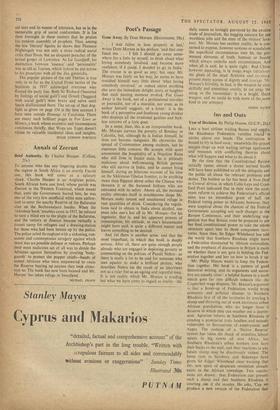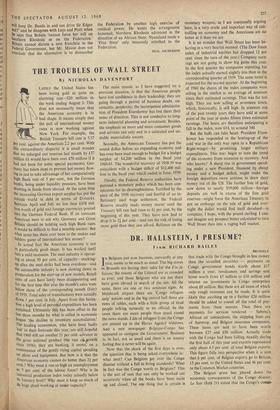Ins and Outs
Year of Decision. By Philip Mason. (0.U.P., 210 LIKE a hurt airliner trailing flames-and srrtoke, the Rhodesian Federation rumbles round in circles above our heads. The contraption is bound to try to land soon.: meanwhile the airport margin clogs up with waiting salvage appliances and resounds with conflicting theories about what will happen and what to do about it.
By the time that the Constitutional Review actually opens, almost a dozen learned books will have been published to tell the delegates and the public all about the relevant problems and duties. The boldest so far has been A New Deal in Central Africa, in which Colin Leys and Cran- ford Pratt indicated that in their view the mini- mum reform to achieve the Federation's official aims was an immediate grant of half the Federal voting power to Africans; however, they were sceptical about the chances of the Federal Government accepting any such changes at the Review Conference, and their underlying sug- gestion was that Britain must be prepared to use her final constitutional power to take the whole structure apart into its three component terri- tories. Since then, Sir Edgar Whitehead has told the world that Southern Rhodesia might leave a Federation dominated by African nationalists, and the emphasis of discussion in Britain is more on whether there is any gain in holding the Fed- eration together and less on how to break it up.
Mr. Philip Mason wants to keep the Federa- tion together. His book is a pattern of good historical writing, and its arguments and narra- tive are equally clear : a helpful feature in a book which goes far into difficult subjects like the Copperbelt wage disputes. Mr. Mason's argument is that a break-up of Federation would bring economic and politiCal disaster to Southern Rhodesia first of all the territories by creating a slump and throwing out of work enormous urban African populations who no longer have a Reserve in which they can weather out a depres- sion. Agrarian reform in Southern Rhodesia is creating a proletariat truly landless and .entirely vulnerable to fluctuations of employment and wages. The cushion of a 'Native Reserve' system has taken the shock of countless labour upsets in big towns all over Africa, but Southern Rhodesia's urban workers now have their backs to the wall, and their reactions to any future slump may be disastrously violent. The latest riots in Salisbury and Bulawayo have given Sir Edgar Whitehead clear warning that this new spirit of desperate resolution already exists in the African townships. Two conclu- sions are drawn: that Federation. can prevent such a slump and that Southern Rhodesia is courting one if she secedes. He asks, 'Can we produce a new version of the Federation that Will keep Dr. Banda in and not drive Sir Edgar out?' and he disagrees with Leys and Pratt when be says that Britain 'cannot force her will on Southern Rhodesia or on the Federation.' Britain cannot dictate a new franchise to the Federal Government, but Mr. Mason does not Conclude that the alternative is to dismember the Federation by another high exercise of residual power. He wants the arrangement loosened; Northern Rhodesia advanced in the direction of an African State; Nyasaland made a 'Free State' only tenuously attached to the Federation.
NEAL ASCHERSON



































 Previous page
Previous page